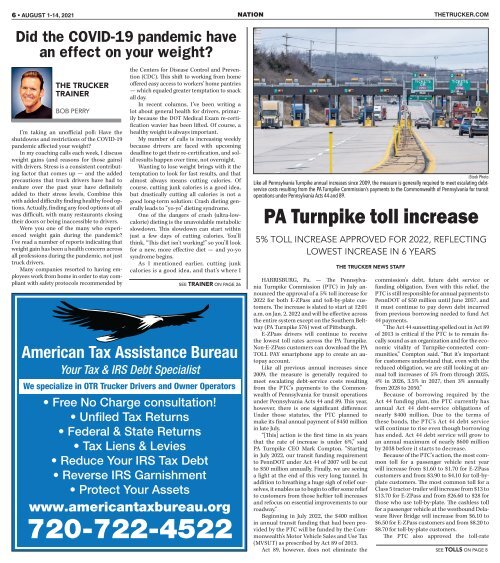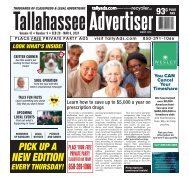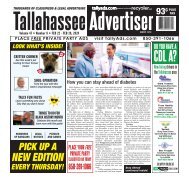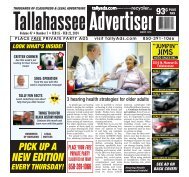Create successful ePaper yourself
Turn your PDF publications into a flip-book with our unique Google optimized e-Paper software.
6 • AUGUST 1-14, 2021 NATION<br />
THETRUCKER.COM<br />
Did the COVID-19 pandemic have<br />
an effect on your weight?<br />
THE TRUCKER<br />
TRAINER<br />
BOB PERRY<br />
I’m taking an unofficial poll: Have the<br />
shutdowns and restrictions of the COVID-19<br />
pandemic affected your weight?<br />
In my coaching calls each week, I discuss<br />
weight gains (and reasons for those gains)<br />
with drivers. Stress is a consistent contributing<br />
factor that comes up — and the added<br />
precautions that truck drivers have had to<br />
endure over the past year have definitely<br />
added to their stress levels. Combine this<br />
with added difficulty finding healthy food options.<br />
Actually, finding any food options at all<br />
was difficult, with many restaurants closing<br />
their doors or being inaccessible to drivers.<br />
Were you one of the many who experienced<br />
weight gain during the pandemic?<br />
I’ve read a number of reports indicating that<br />
weight gain has been a health concern across<br />
all professions during the pandemic, not just<br />
truck drivers.<br />
Many companies resorted to having employees<br />
work from home in order to stay compliant<br />
with safety protocols recommended by<br />
the Centers for Disease Control and Prevention<br />
(CDC). This shift to working from home<br />
offered easy access to workers’ home pantries<br />
— which equaled greater temptation to snack<br />
all day.<br />
In recent columns, I’ve been writing a<br />
lot about general health for drivers, primarily<br />
because the DOT Medical Exam re-certification<br />
wavier has been lifted. Of course, a<br />
healthy weight is always important.<br />
My number of calls is increasing weekly<br />
because drivers are faced with upcoming<br />
deadline to get their re-certification, and solid<br />
results happen over time, not overnight.<br />
Wanting to lose weight brings with it the<br />
temptation to look for fast results, and that<br />
almost always means cutting calories. Of<br />
course, cutting junk calories is a good idea,<br />
but drastically cutting all calories is not a<br />
good long-term solution: Crash dieting generally<br />
leads to “yo-yo” dieting syndrome.<br />
One of the dangers of crash (ultra-lowcalorie)<br />
dieting is the unavoidable metabolic<br />
slowdown. This slowdown can start within<br />
just a few days of cutting calories. You’ll<br />
think, “This diet isn’t working!” so you’ll look<br />
for a new, more effective diet — and yo-yo<br />
syndrome begins.<br />
As I mentioned earlier, cutting junk<br />
calories is a good idea, and that’s where I<br />
SEE TRAINER ON PAGE 26<br />
American Tax Assistance Bureau<br />
Your Tax & IRS Debt Specialist<br />
We specialize in OTR Trucker Drivers and Owner Operators<br />
• Free No Charge consultation!<br />
• Unfiled Tax Returns<br />
• Federal & State Returns<br />
• Tax Liens & Levies<br />
• Reduce Your IRS Tax Debt<br />
• Reverse IRS Garnishment<br />
• Protect Your Assets<br />
www.americantaxbureau.org<br />
720-722-4522<br />
iStock Photo<br />
Like all Pennsylvania Turnpike annual increases since 2009, the measure is generally required to meet escalating debtservice<br />
costs resulting from the PA Turnpike Commission’s payments to the Commonwealth of Pennsylvania for transit<br />
operations under Pennsylvania Acts 44 and 89.<br />
PA Turnpike toll increase<br />
5% TOLL INCREASE APPROVED FOR 2022, REFLECTING<br />
LOWEST INCREASE IN 6 YEARS<br />
HARRISBURG, Pa. — The Pennsylvania<br />
Turnpike Commission (PTC) in July announced<br />
the approval of a 5% toll increase for<br />
2022 for both E-ZPass and toll-by-plate customers.<br />
The increase is slated to start at 12:01<br />
a.m. on Jan. 2, 2022 and will be effective across<br />
the entire system except on the Southern Beltway<br />
(PA Turnpike 576) west of Pittsburgh.<br />
E-ZPass drivers will continue to receive<br />
the lowest toll rates across the PA Turnpike.<br />
Non-E-ZPass customers can download the PA<br />
TOLL PAY smartphone app to create an autopay<br />
account.<br />
Like all previous annual increases since<br />
2009, the measure is generally required to<br />
meet escalating debt-service costs resulting<br />
from the PTC’s payments to the Commonwealth<br />
of Pennsylvania for transit operations<br />
under Pennsylvania Acts 44 and 89. This year,<br />
however, there is one significant difference:<br />
Under those statutes, the PTC planned to<br />
make its final annual payment of $450 million<br />
in late July.<br />
“[This] action is the first time in six years<br />
that the rate of increase is under 6%,” said<br />
PA Turnpike CEO Mark Compton. “Starting<br />
in July 2022, our transit funding requirement<br />
to PennDOT under Act 44 of 2007 will be cut<br />
to $50 million annually. Finally, we are seeing<br />
a light at the end of this very long tunnel. In<br />
addition to breathing a huge sigh of relief ourselves,<br />
it enables us to begin to offer some relief<br />
to customers from those heftier toll increases<br />
and refocus on essential improvements to our<br />
roadway.”<br />
Beginning in July 2022, the $400 million<br />
in annual transit funding that had been provided<br />
by the PTC will be funded by the Commonwealth’s<br />
Motor Vehicle Sales and Use Tax<br />
(MVSUT) as prescribed by Act 89 of 2013.<br />
Act 89, however, does not eliminate the<br />
THE TRUCKER NEWS STAFF<br />
commission’s debt, future debt service or<br />
funding obligation. Even with this relief, the<br />
PTC is still responsible for annual payments to<br />
PennDOT of $50 million until June 2057, and<br />
it must continue to pay down debt incurred<br />
from previous borrowing needed to fund Act<br />
44 payments.<br />
“The Act 44 sunsetting spelled out in Act 89<br />
of 2013 is critical if the PTC is to remain fiscally<br />
sound as an organization and for the economic<br />
vitality of Turnpike-connected communities,”<br />
Compton said. “But it’s important<br />
for customers understand that, even with the<br />
reduced obligation, we are still looking at annual<br />
toll increases of 5% from through 2025,<br />
4% in 2026, 3.5% in 2027, then 3% annually<br />
from 2028 to 2050.”<br />
Because of borrowing required by the<br />
Act 44 funding plan, the PTC currently has<br />
annual Act 44 debt-service obligations of<br />
nearly $400 million. Due to the terms of<br />
these bonds, the PTC’s Act 44 debt service<br />
will continue to rise even though borrowing<br />
has ended. Act 44 debt service will grow to<br />
an annual maximum of nearly $600 million<br />
by 2038 before it starts to decrease.<br />
Because of the PTC’s action, the most common<br />
toll for a passenger vehicle next year<br />
will increase from $1.60 to $1.70 for E-ZPass<br />
customers and from $3.90 to $4.10 for toll-byplate<br />
customers. The most common toll for a<br />
Class 5 tractor-trailer will increase from $13 to<br />
$13.70 for E-ZPass and from $26.60 to $28 for<br />
those who use toll-by-plate. The cashless toll<br />
for a passenger vehicle at the westbound Delaware<br />
River Bridge will increase from $6.10 to<br />
$6.50 for E-ZPass customers and from $8.20 to<br />
$8.70 for toll-by-plate customers.<br />
The PTC also approved the toll-rate<br />
SEE TOLLS ON PAGE 8

















